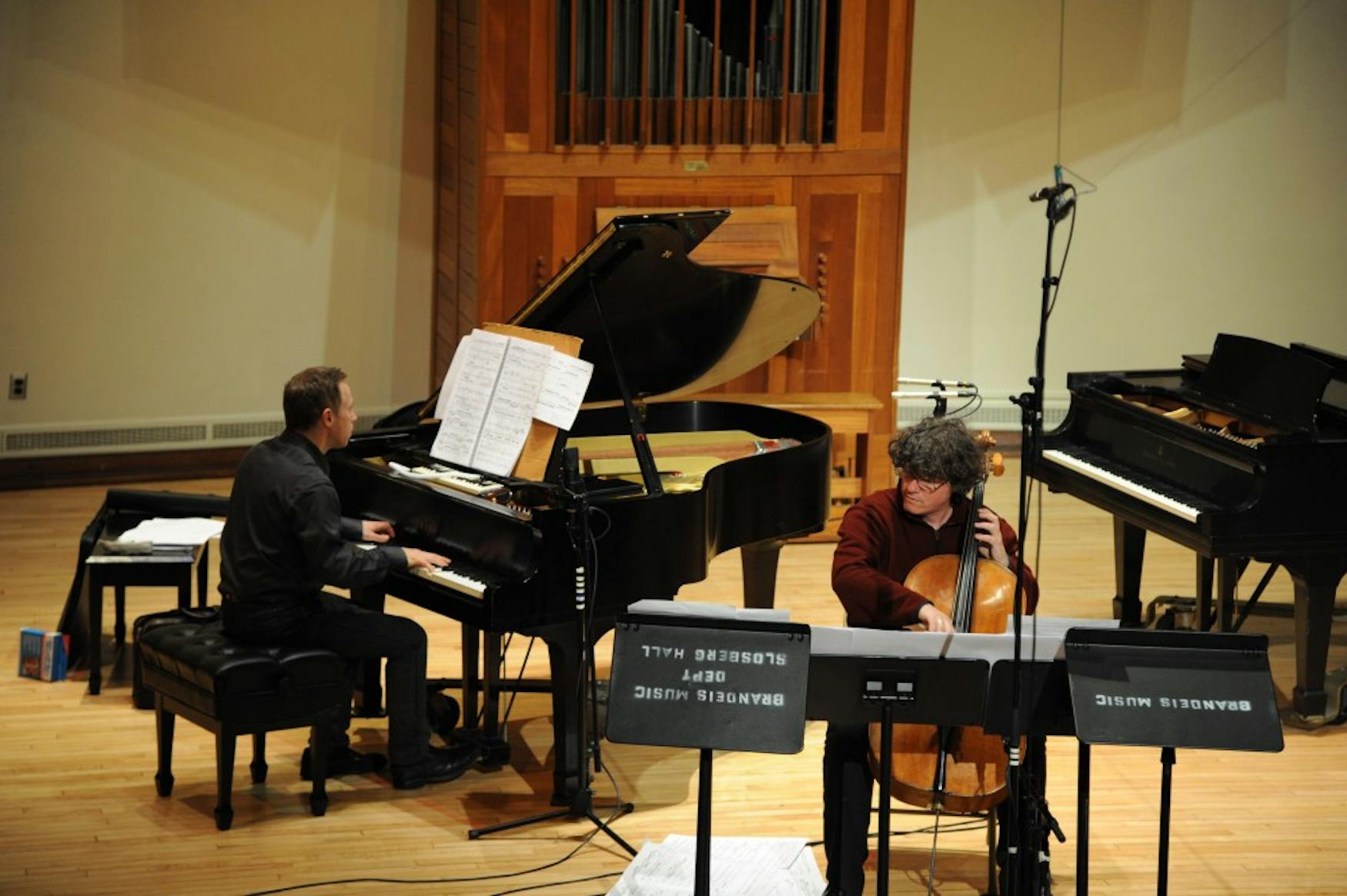Performance stretches musical bounds
At 7:00 p.m. on Sunday, the Slosberg Music Center held a concert that featured six pieces composed by students but played by professional musicians.
The musicians were David Russell and Geoffrey Burleson, and they played pieces that were written for cello and piano. Russell played the cello and Burleson played the piano. (Some pieces included only one of these instruments; other pieces included both).
The concert was introduced as “a great opportunity for the students to hear their pieces played by professionals.”
The pieces were new music, a genre that’s not about making aesthetically pleasing music but rather trying something new, making something different from what’s been done before and expressive. It employs the technique of discordance, which takes apart chords and puts them back together in a different way.
The effect can be somewhat strange and unusual, in that the notes that normally sound like they go together are now paired in a way that doesn’t necessarily sound pleasing to the ear.
The concept of melody is for the most part absent in the genre of new music, making it radically different from what people are used to hearing.
This strangeness was not absent in Sunday night’s concert. For me, as someone who has never studied music or heard any pieces in this genre before, the pieces did not resemble much in the way of music. They included many pauses throughout each piece, and often the different parts of each piece didn’t seem to have anything to do with one another. About new music, one of the composers, Emily Koh (Ph.D. ’16), wrote in an email to the Justice that new music is “something to listen to with very open ears. It’s not just music, but an experience.” Another one of the composers, James Praznik (Ph.D.), wrote in an email to the Justice, “the most important statement I can make about new music is the element of narrative … It is always interesting to see how the large scale message of a piece unfolds with lesser importance put on the moment to moment accessibility of the piece.”
Praznik’s piece, “After Recoiling…” written for the cello, was comprised of short bursts of playing, interspersed with Russel tapping his hand on the wood of the cello. The effect was jarring. According to the program, the piece was composed with the intent of having “half a phrase that neither begins nor ends a narrative” and “[t]he implication of the element of surprise.” In this, the piece certainly succeeded.
The fourth piece, “Smidgen(S)” composed by Koh, featured a technique called playing inside the piano. To do this, the pianist stands up and reaches inside the piano and can either pluck the strings inside or mute notes and press the keys outside. In the program, Koh describes her piece as “a musical depiction of the first tastes of the spices—fennel, clove, pepper, star anise and cinnamon.”
The last piece was introduced to the audience as “the best for last.” The piece, “Suono Infinito,” was composed for cello and piano by Gleb Kanasevich (Ph.D. ’19). It was an extremely radical piece.
The musicians arrived on stage with pages and pages of scores. More interestingly, the pianist brought a melodica on stage, an instrument that has the same function as a harmonica but looks like a miniature piano. It has keys and a tube attached to the side of it that the pianist would blow into while pressing keys. The piece was composed of sound—popping, tapping and plucking—from both the cello and piano. It was 25 minutes of noises. Many of the audience members laughed at points in the performance, for it was meant to be somewhat of a comedic piece. Indeed, many of them were laughing before the piece even began, presumably knowing what was coming. When asked for a paragraph about the piece for the program, Kanasevich submitted a paragraph of entirely slashes, dashes and periods, meant to be Morse code; a clear hint about the piece.
The audience gave thunderous applause after the last piece. While someone who studies music may have been able to enjoy the performance, for me, it was really difficult to enjoy something that didn’t even sound like music but just various sounds thrown together.
Music shouldn’t be something you can only enjoy if you’ve studied it but should be something anyone can enjoy.
Perhaps though, new music will become more popular and common and its style won’t be so alien anymore.




Please note All comments are eligible for publication in The Justice.